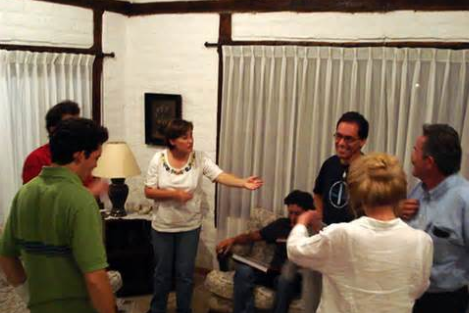Does Anyone Live Next to Normal?

Sibling rivalry
Dear StreetShepherd,
My brother is in and out of jobs and has just recently left his family probably for good. How can I talk to him to instill in him the responsibility and accountability to take care of his wife and two small children? His wife currently wants to move in with us, and I don’t know what to do.
I help them financially, but I am not prepared to take in his entire family which will tax our resources to the max. My brother left them with nowhere else to turn. I offered to watch my sister-in-law’s kids while she works, but she is opposed to the idea, and just wants to keep getting a handout at every turn. I feel sorry for the kids, but how can I get her to understand she has to work to help herself.
And my brother, no one knows where he is now, he may have even left the state for all we know or be incarcerated, we have no clue what to do. My husband feels it is the Christian thing to do to allow them to live with us “for a short amount of time,” but he does not realize that once they move in and disrupt our lives I am afraid I will never get them back out and “on their own.” We are also struggling financially, but since I am willing to work two jobs and so is my husband, we are now well above water and coming back to being healthy financially and spiritually as a result.
What should we do to help my brother’s family? I am afraid my sister-in- law’s situation will soon become desperate and destitute as she is doing nothing to help herself?
Lorissa G.
Dear Lorrissa,
The thought of enabling others just sounds so Christian, supposedly. Life is the result of choices. They all add up, and its sum should measure out to some form of success. Whenever we fail, we hold this right to wanna blame others, and that's why we look for enablers - or people who will easily excuse our behaviors.
Whatever trials impact our life, we must either, react or respond to the situation with our own version of accountability. Now obviously you've chosen to respond rightly. Problem is no one else is in agreement with you. Since these other parties have also responded somewhat differently, this is where tactic must come in to keep yourself safe, while you risk vulnerability to reach out.
First identify what the gap is. (fear, frustration, ignorance, anxiety, etc.) Next you can, with some distance help them in setting some small, attainable goals. These will build confidence for them and him, to think more positively.
Talking about the elephant in the room will certainly bring tension. Careful, because tension without a solution will only produce fear in, and for them. So when you're sharing explorable options, also share risk / reward illustrations with them as well, so they'll see how responding vs. reacting can be of benefit.
In the case that your brother is MIA, that is tough in of itself. But as you let these others know the obligations required to be accountable, they also can be setting healthy boundaries to teach him, and must also learn to understand yours.
StreetShepherd
Editors note: So what is the difference between enabling and supporting the family name? If you felt bias was wrong in this article, how would you have reacted if it was your family? How do we help those who are unwilling to help themselves? When we help those in need, are we in essence enabling them? Tough questions, no doubt.
Some examples of enabling go on in most all of our households in some form. Such as:
-
Cleaning up messes continually after each mistake (not always drug/alcohol)
-
Continual car repair after "not my fault" collisions
-
Believing that particular person is just under a lot more stress lately
-
Forgiving the abuser repeatedly because you don't want to stir things up
-
Finding excuse to say again "O.K., but this is the last time"
-
Just accepting they're different, besides they're family.
There are dozens of scenarios we all could write in and say I didn't mention them, I know. Yet, the idea is that if we are repeatedly having to amend the behavior. Having to make concessions that are uncomfortable for ourselves and others to accommodate. Or require more from us than are able to offer. Then yes, it's probably a form of enabling.
Overprotecting those we love most from making mistakes, (outside of serious addiction issues) is how often we'll do for them what they're capable to do themselves. Preventing people from having to deal with consequences or rescue them before they make mistakes is what we're discussing now.
This great article I read defines enable as: to supply with the means, knowledge, or opportunity to be or do something -- to make feasible. Vertical relationships almost always have an external focus. Different roles. Different positions. Different drivers. Each of these much go through different stages of a process.
External focus begins to look like this. The shame, contempt, and abandonment are just more ways to continue the power of guilt for which we enable the person by.
- Avoid
- Ignore
- Fix
- Control
For as long as they exist, the vertical relationship exists. You dare not pull out, lest they fall apart. By now you avoid, ignore, fix, or control mistakes so no further ones are to be made. Even if it causes uncomfortable accommodations. Should I choose to ask others to excuse my behavior, then I must keep the external focus up, and not the internal.
Rationalizing our own decisions to just deal with it, because it's "our problem" or a "family matter" is true. Not properly managed or communicated effectively, will create bigger, unmanageable problems later.
Anxiety and distraction will almost always cover up the guilt of the situation, so there's no power for either party to move forward. No addict ever overcomes from the place of guilt, but from the place of shame. In other words, when you're continually distracted with guilt - about guilt, and about not helping, then you'd rather just enable instead. So again, we just avoid, control, fix, and ignore until it or them, just goes away. The simple path of least resistance.
This is exactly how and why we at Judy House mentor in our community. We quickly out of these vertical relationships look for enablers, but we exist to encourage men out of these roles to live into accountability, better communication skills, that create more realistic expectations.








